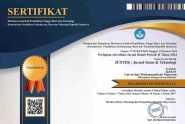Optimization Of Progressive Scientific Literacy Based On The Sciedugame Mobile Application On The Topic Of Earth And The Solar System At SMP Negeri 56 Surabaya
Abstract
This study aimed to analyze the effect of the Sciedugame Mobile application on the development of students’ progressive scientific literacy in junior high school science learning. A quasi-experimental design was employed with two eighth-grade classes at SMP Negeri 56 Surabaya. The experimental class used the Sciedugame Mobile application, while the control class received conventional instruction. Data were collected through pre-test and post-test assessments, classroom observations, and student questionnaires. The results showed that the experimental group achieved higher learning gains than the control group. The average post-test score in the experimental class was 68.38, compared to 58.48 in the control class. The normalized gain (N-Gain) in the experimental group was 0.49 (moderate), while the control group scored 0.36. A t-test confirmed a significant difference between the two groups (tcount = 1.87 > ttable = 1.67 at α = 0.05). In addition, scientific literacy indicators—such as conceptual understanding, scientific process skills, and real-life application—improved more significantly in the experimental class. Observation results also indicated higher implementation quality in the experimental group (97.44%) compared to the control group (76.92%). Furthermore, student responses toward the application were overwhelmingly positive in terms of usability, content clarity, and engagement. These findings suggest that Sciedugame Mobile is a promising mobile learning tool to support progressive scientific literacy in science education.
Keywords
Full Text:
PDFReferences
Andari, R. (2020). PEMANFAATAN MEDIA PEMBELAJARAN BERBASIS GAME EDUKASI KAHOOT! PADA PEMBELAJARAN FISIKA. 6(1). https://scholar.google.co.kr/citations?u
Anwar, N. R., & Winingsih, E. (2021). PENGARUH KECANDUAN GAME ONLINE TERHADAP PRESTASI AKADEMIK SISWA SEKOLAH MENENGAH PERTAMA NEGERI 5 BANJAR DIMASA PANDEMI COVID-19. https://ejournal.unesa.ac.id/index.php/jurnal-bk-unesa/article/view/44159/37560
Ghanad, A. (2023). An Overview of Quantitative Research Methods. INTERNATIONAL JOURNAL OF MULTIDISCIPLINARY RESEARCH AND ANALYSIS, 06(08). https://doi.org/10.47191/ijmra/v6-i8-52
Haidar, W. M., & Antika, E. R. (2022). Prestasi Akademik Siswa Ditinjau Dari Kecanduan Bermain Game Online Mobile Legends. TERAPUTIK: Jurnal Bimbingan Dan Konseling, 5(3), 319–325. https://doi.org/10.26539/teraputik.53872
Hake, R. R. (1998). Interactive-engagement versus traditional methods: A six-thousand-student survey of mechanics test data for introductory physics courses. American Journal of Physics, 66(1), 64–74. https://doi.org/10.1119/1.18809
Hosseini, H., Chalak, A., & Biria, R. (2019). Impact of Backward Design on Improving Iranian Advanced Learners’ Writing Ability: Teachers’ Practices and Beliefs. International Journal of Instruction, 12(2), 33–50. https://doi.org/10.29333/iji.2019.1223a
Karlina, L., & Abidin, Z. (2022). Meta analisis pengembangan media pembelajaran game edukasi biologi berbasis soal HOTS (Higher Order Thinking Skill) terhadap literasi sains siswa SMA. Jurnal Ilmiah Wahana Pendidikan, 8(10), 209–215. https://doi.org/10.5281/zenodo
Kemendikbudristek. (2022). Capaian Pembelajaran Ilmu Pengetahuan Alam Fase D. Kementerian Pendidikan, Kebudayaan Dan Riset Teknologi Republik Indonesia.
Kemenkes. (2018). Kemenkes: Kecanduan Game Adalah Gangguan Perilaku. Kementerian Kesehatan Republik Indonesia.
Mayer, R. E. (2005). The Cambridge Handbook of Multimedia Learning. Cambridge University Press. http://molwave.chem.auth.gr/sigalas_edu/files/Multimedia_Learning.pdf
Ode, A. S. (2019). KEMAMPUAN BERPIKIR KRITIS DAN KREATIF MATEMATIS MELALUI PEMBELAJARAN BERBASIS MASALAH. In Journal of Mathematics Education and Science (Vol. 5, Issue 1).
OECD. (2017). PISA 2015 Assessment and Analytical Framework. OECD. https://doi.org/10.1787/9789264281820-en
OECD. (2023). PISA 2022 Results Factsheets Indonesia PUBE. https://oecdch.art/a40de1dbaf/C108.
Ortikov, U., & Ugli, K. (2024). THE EFFECTIVENESS OF TECHNOLOGY-ENHANCED LANGUAGE LEARNING METHODS (Vol. 4, Issue 3). www.oriens.uz
Oskarita, E., & Arasy, H. N. (2024). The Role of Digital Tools in Enhancing Collaborative Learning in Secondary Education. International Journal of Educational Research, 1(1), 26–32. https://doi.org/10.62951/ijer.v1i1.15
Pearson, K. (1900). X. On the criterion that a given system of deviations from the probable in the case of a correlated system of variables is such that it can be reasonably supposed to have arisen from random sampling. The London, Edinburgh, and Dublin Philosophical Magazine and Journal of Science, 50(302), 157–175. https://doi.org/10.1080/14786440009463897
Rahayu, M., Asyhari, A., & Anjani, A. V. (2022). Scaffolding in guided inquiry learning with google classroom: Effect on physics conceptual understanding. Jurnal Inovasi Pendidikan IPA, 8(2), 174–184. https://doi.org/10.21831/jipi.v8i2.48365
Ryan, R. M., & Deci, E. L. (1985). Self-Determination Theory and the Facilitation of Intrinsic Motivation, Social Development, and Well-Being Self-Determination Theory. Ryan.
Singh, C. K. S., Lebar, O., Kepol, N., Rahman. Rafiah Abdul, & Mukhtar, K. A. M. (2017). An Observation Of Classroom Assessment Practices Among Lecturers In Selected Malaysian Higher Learning Institutions. Malaysian Journal of Learning and Instruction, 14(1), 23–61.
Sugiyono. (2022). Metode Penelitian Kuantitatif Kualitatif Dan R&D (2nd ed.). Alfabeta.
Sweller, J. (1988). Cognitive Load During Problem Solving: Effects on Learning. In COGNITIVE SCIENCE (Vol. 12).
VYGOTSKY, L. S. (1980). Mind in Society (M. Cole, V. Jolm-Steiner, S. Scribner, & E. Souberman, Eds.). Harvard University Press. https://doi.org/10.2307/j.ctvjf9vz4
Wiggins, B. J., & Christopherson, C. D. (2019). The replication crisis in psychology: An overview for theoretical and philosophical psychology. Journal of Theoretical and Philosophical Psychology, 39(4), 202–217. https://doi.org/10.1037/teo0000137
DOI: https://doi.org/10.31764/justek.v8i3.33224
Refbacks
- There are currently no refbacks.
JUSTEK : Jurnal Sains dan Teknologi sudah terindeks
EDITORIAL OFFICE:












.JPG)

